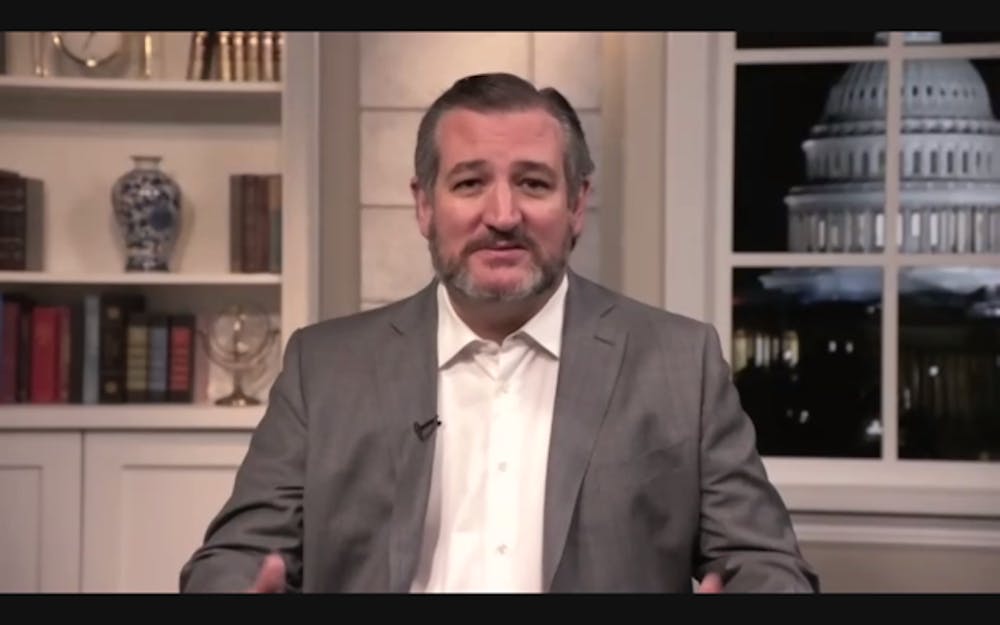On Thursday, March 4, the American Whig-Cliosophic Society (Whig-Clio) voted to rescind its highest honor, the James Madison Award for Distinguished Public Service (JMA), from Sen. Ted Cruz ’92 (R-Texas).
Following a 90 minute assembly, where speeches were given for and against rescinding, 37 people voted in favor of rescinding, 32 voted not to rescind, and five people abstained. The motion’s passing marked the first time Whig-Clio voted to rescind a JMA.
The result will be passed on to the Whig-Clio Board of Trustees, who will decide whether to officially revoke Cruz’s award.
The JMA has been granted by Whig-Clio since 1960. The award is bestowed upon an individual who has “taken up the arduous but righteous cause of dedicating their life to the betterment of society.”
Cruz was given the award in 2016. Other recent recipients have included members of both major political parties — including Republicans such as former Secretary of State George Shultz ’42 and former Supreme Court Justice Antonin Scalia, as well as Democrats such as former President Jimmy Carter, Supreme Court Justice Stephen Breyer, and most recently Rep. Terri Sewell ’86 (D-Ala).
The debate over whether or not to revoke Cruz’s award followed his decision to object to the certification of electoral votes in the 2020 election amid a domestic insurrection at the U.S. Capitol that resulted in the deaths of five individuals.
In a Jan. 25 statement regarding attempts to revoke Cruz’s award, the Society’s right-leaning Cliosophic Party rejected the action, claiming it “threatens to further divide us at a time when we need unity and healing.”
Following the Whig-Clio constitution, the Assembly was called following the circulation of a petition launched by Brent Kibbey ’21 that required the signatures of at least one-fifth of the members.

The assembly lasted 90 minutes. The first 45 minutes were split evenly between speeches for and against rescinding. The remaining time was open to any speaker.
In the first half of the assembly, 14 people spoke in favor of rescinding Cruz’s JMA, and eight spoke in opposition. 22 people spoke in the open discussion, some of whom had already spoken in the first half, and not all of whom took a side. 45 people spoke in total.
In an interview with The Daily Princetonian, Kibbey noted he was confident that the Board would not overturn the Assembly’s decision.
“At the end of the day, the student organization came together as a body, signaled how they felt on the matter, and the trustees usually are agreeable to that,” he noted.

Sullivan Meyer ’24 also supported revoking Senator Cruz’s award. Meyer is the vice president of legislative affairs for Princeton College Democrats, but he was speaking in his personal capacity, not on behalf of the organization.
“It’s just a matter of deciding whether he deserves to hold that award based on that conduct and to me that’s a hard no… People died in the Capitol building… what Senator Cruz did was so vile, deceitful, and cynical; the society, myself included, had to do something direct and immediate,” he said.
Meyer made clear that he does not believe revoking the award is part of a larger “cancel culture” targeting conservatives.
“I have no problem with Republicans and conservatives getting the JMA. There are conservatives on the recipient list who I disagree with but who I feel are deserving recipients and committed public servants,” Meyer added.
In a text message to the ‘Prince,’ Matthew Wilson ’24, the Clio Party chair, voiced his displeasure with the results.
“The Assembly’s decision to recommend revoking Senator Ted Cruz’s JMA was embarrassing, and Whig-Clio members who supported the revocation did real damage to the integrity of the Society,” he noted. “Whig-Clio cannot claim to be a non-partisan organization if we hold Republican politicians to different standards than we do Democrats.”
“I have made clear my unequivocal condemnation of Cruz’s objections to the certification of Electoral College votes from Arizona and Pennsylvania on Jan. 6, but his objections were not unprecedented, and the results of this Assembly amount to nothing more than a conceited attempt by left-wing students to inflate their own egos and cancel Princeton’s most prominent conservative alumnus,” Wilson wrote.
Joe Ort ’21, president of Princeton Mock Trial, one of Whig-Clio’s subsidiaries, recently wrote an op-ed opposing the revoking of Senator Cruz’s award.
“It seemed to me that based on Senator Cruz’s rhetoric up to this point if the award was revoked from him… he would very much incorporate it into an aggrieved narrative of cancel culture… to further his morally odious ends,” Ort added in an interview with the ‘Prince’ following the publication of the voting results.
“We sometimes tend to inflate the importance of what we do in Whig-Clio but we still are a political society, and we stand for something and that’s democracy,” said an anonymous member of Whig-Clio who supported the decision to revoke the award. “Removing the award from Ted Cruz may not actually substantially hit him, but I think it’s a very small gesture going along with what we stand for,” the student added.
The results of the assembly were certified by the Constitutional Compliance Committee as dictated by the Whig-Clio constitution. The Whig-Clio Board of Trustees will receive the results of the vote and minutes from the assembly.
Sen. Cruz’s office did not respond to request for comment by the time of publication.








